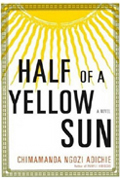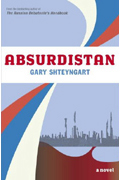
The Morning News Tournament of Books, sponsored by Powell’s Books, is an annual battle royale amongst the top novels in “literary fiction” published throughout the year. Read more about this year’s tournament »
» Buy the Books at Powells.com «
» Meet This Year’s Judges «
» Check the Bloggers’ Office Pool «
» Relive the Action: 2006, 2005 «
» Contact the Tournament Staff «
• ROUND ONE • MATCH ONE •
March 8, 2007
 |
Half of a Yellow Sunby CHIMAMANDA NGOZI ADICHIE |

|
| v. | ||
Absurdistanby GARY SHTEYNGART |
judged by BRADY UDALL
A few years ago I was sitting in a hotel lobby across from the writer Elwood Reid, who was reading a book and laughing. Elwood is an imposing, 300-pound ex-football player with a deep nihilistic streak, and while I would never call him humorless, I think it’s safe to say he’s not easily amused. But this book was making him laugh. At one point he raised his big head out of the book and said to no one in particular, “This shit is classic!” I didn’t know what the book was, or who wrote it, but I resolved right then to read it immediately. If it could make Elwood laugh, who knows, maybe it could improve my looks.
The book turned out to be The Russian Debutante’s Handbook, the first novel by Gary Shteyngart. It’s a supremely well-written book, funny on nearly every page, full of zinging dialogue and sparkling description. Unfortunately, the book falls apart in the second half. The plot deflates, the characters become caricatures of themselves, and the whole thing devolves into tepid farce. But I didn’t care; the book had potential. I’ve long been of the opinion that the comic novel is the most difficult literary form, an observation based largely on the fact that there are so very few great comic novels and so very many crappy ones. The Russian Debutante’s Handbook isn’t a great comic novel, but it’s a good one, and it gave me hope.
• •
You can imagine my anticipation, then, when I cracked the spine of Absurdistan, Shteyngart’s highly-touted second novel. Absurdistan is the story of Misha Vainberg, the morbidly obese son of the 1,238th-richest man in Russia, who is thwarted at every turn in his attempt to return to the Bronx, where his beloved, trash-talking homegirl Rouenna awaits him. Absurdistan has much of what made The Russian Debutante’s Handbook so good: spectacular prose, lushly idiosyncratic detail, and 1,001 witty asides. What it doesn’t have is much of a plot, or compelling human characters, or any real notion of what it’s trying to say or do. Though there are some hilarious sequences, too often the humor comes off as sophomoric, desperate to please. There are inane puns, a lot of off-the-cuff rap (my name is Vainberg/ I like ho’s/ I sniff ‘em out/ Wid my Hebrew nose), and several appearances by the author himself, cleverly disguised as Jerry Shteynfarb (get it?), the author of the hit novel The Russian Arriviste’s Hand Job (get it now?). By the time I finished it, I couldn’t help but feel that the book didn’t work because the characters and their stories suffer at the expense of the author’s admiration for his own formidable wit and charms.
After the zany shenanigans of Absurdistan, I was more than ready for the violence and tragedy of the Nigerian civil war, as depicted in Chimamanda Ngozi Adichie’s Half of a Yellow Sun. The novel is told from the perspective of three characters: 13-year-old Ugwu, the houseboy of a revolutionary college professor; Olana, the professor’s mistress; and Richard, a timid Englishman who pines after Olana’s twin sister. The novel is at its most energetic and compelling in Ugwu’s sections. He is an innocent, one who absorbs the small details of a world that has the inexhaustible power to seduce his sense of wonder, and somehow he is the perfect lens through which to filter the bloody horrors and degradations of war. The narrative occasionally drags in the other sections, often because the author burdens the characters with the task of explaining the war and its historical context. For a war novel there is a distressing surplus of discourse, with characters holding forth in long paragraphs on subjects like Marxism, European colonialism, and tribal politics. Despite its inability to gain much traction early on, the narrative eventually coalesces very nicely into a compassionate and clear-eyed story told with confidence and with the intuitive understanding that true history concerns itself with the lives of individuals.
• About the Judge •
• From the Booth •
| Actually it’s less like plagiarism and more like three writers sharing a widely held belief, but this is America, dammit! I want to be aggrieved. | Kevin | John | Our first matchup features a couple of up-and-comers whose names I have to double-check every time I type them, which is annoying. |
» Read Kevin Guilfoile & John Warner’s commentary on the match «

» DOWNLOAD THE BRACKETS «
• Round One •
Half of a Yellow Sun v. Absurdistan
judged by Brady Udall
The Echo Maker v. The Emperor’s Children
judged by Marcus Sakey
Firmin v. Brookland
judged by Sarah Hepola
The Second Coming of Mavala Shikongo v. The Road
judged by Maria Schneider
Arthur and George v. One Good Turn
judged by Kate Schlegel
The Lay of the Land v. English, August
judged by Colin Meloy
Alentejo Blue v. Apex Hides the Hurt
judged by Dan Chaon
Against the Day v. Pride of Baghdad
judged by Anthony Doerr
• Round Two •
Half of a Yellow Sun v. The Emperor’s Children
judged by Jessa Crispin
Firmin v. The Road
judged by Mark Sarvas
One Good Turn v. The Lay of the Land
judged by Maud Newton
Alentejo Blue v. Against the Day
judged by Sam Lipsyte
• SEMIFINALS •
Half of a Yellow Sun v. The Road
judged by Elizabeth Gaffney
One Good Turn v. Against the Day
judged by Sasha Frere-Jones
• ZOMBIE ROUND •
The Road v. Against the Day
judged by Andrew Womack
One Good Turn v. Absurdistan
judged by Rosecrans Baldwin

